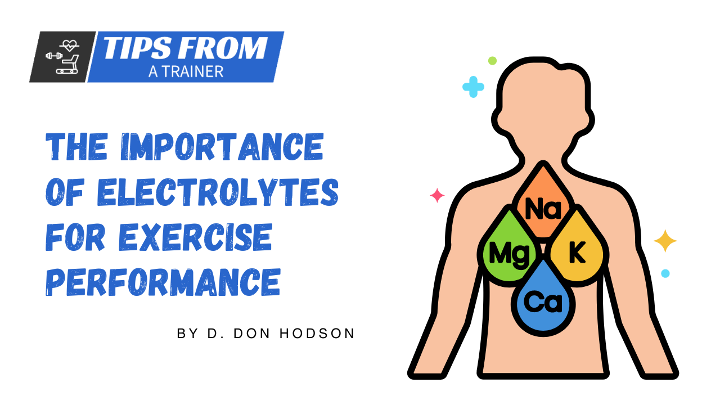Introduction
In the world of sports and physical activity, optimal performance is a key goal for athletes and enthusiasts alike. To achieve peak performance, various factors come into play, including training, nutrition, and hydration. One crucial element that often gets overlooked is the role of electrolytes.
Electrolytes play a vital role in maintaining fluid balance, facilitating muscle contractions, and supporting nerve functions, all of which are essential for optimal sports performance. In this article, we will explore the importance of electrolytes and how they impact sports performance.
Table of Contents
Introduction
What Are Electrolytes?
Understanding Sports Performance
The Impact of Electrolytes on Muscle Function
Sodium and Muscle Contractions
Potassium and Muscle Relaxation
Calcium and Muscle Contraction
Magnesium and Muscle Relaxation
The Role of Electrolytes in Nerve Transmission
Sodium and Nerve Impulse Transmission
Potassium and Nerve Function
Calcium and Nerve Signaling
Magnesium and Nerve Regulation
Electrolytes and Hydration Status
Fluid Balance and Electrolytes
Electrolyte Loss through Sweat
Optimal Hydration for Performance
Monitoring Hydration and Electrolyte Intake
Electrolyte Imbalance and Performance Consequences
Hyponatremia
Hypernatremia
Hypokalemia
Hyperkalemia
Electrolyte-Rich Food Sources
Sodium
Potassium
Calcium
Magnesium
Electrolyte Supplementation
Conclusion

What Are Electrolytes?
Electrolytes are minerals that carry an electric charge when dissolved in fluids, such as blood and bodily fluids. They are vital for maintaining proper hydration and supporting numerous physiological functions. The most common electrolytes found in the body include sodium, potassium, calcium, and magnesium. Each electrolyte plays a unique role in ensuring the body's cells function optimally.
Sodium is primarily responsible for maintaining fluid balance and regulating blood pressure. It is crucial for nerve impulse transmission, muscle contractions, and maintaining the body's pH balance. Sources of sodium include table salt, processed foods, and electrolyte-rich sports drinks.
Potassium is essential for maintaining proper muscle function, including regulating muscle contractions and preventing cramps. It also plays a role in maintaining a steady heartbeat and supporting nerve cell communication. Good sources of potassium include bananas, oranges, avocados, and leafy green vegetables.
Calcium is well-known for its role in building strong bones and teeth. However, it also plays a crucial role in muscle contraction, nerve function, and blood clotting. Dairy products, leafy greens, and fortified foods are excellent sources of calcium.
Magnesium is involved in over 300 biochemical reactions in the body, including energy production, muscle relaxation, and DNA synthesis. It also supports proper nerve and muscle function. Foods rich in magnesium include nuts, seeds, legumes, and whole grains.
Understanding Sports Performance
Sports performance encompasses the physical and mental capabilities required to excel in athletic endeavors. It involves strength, speed, endurance, agility, coordination, and focus. To achieve optimal performance, athletes must understand the physiological mechanisms that contribute to their athletic abilities.
During exercise, the body's energy production systems are engaged to fuel muscle contractions. The primary energy sources are carbohydrates and fats, which are metabolized to provide adenosine triphosphate (ATP), the energy currency of cells. Electrolytes play a critical role in this process by facilitating the transport of nutrients, maintaining cellular hydration, and supporting muscle contractions.
Fluid balance is crucial for sports performance as even minor dehydration can impair cognitive function, reaction time, and muscular strength. Proper hydration helps regulate body temperature, remove waste products, and deliver nutrients to working muscles. Electrolytes, along with fluids, are necessary to maintain the body's fluid balance and ensure optimal performance.
In the next sections, we will delve deeper into the specific roles of electrolytes in sports performance, including their impact on muscle function, nerve transmission, and hydration status. Understanding these mechanisms will help athletes and active individuals recognize the importance of maintaining electrolyte balance for optimal sports performance.
The Impact of Electrolytes on Muscle Function
Muscle function is a fundamental aspect of sports performance, as it determines an athlete's strength, power, and endurance. Electrolytes play a crucial role in supporting optimal muscle function and preventing muscle cramps or fatigue.
Sodium and Muscle Contractions
Sodium is essential for muscle contractions as it helps transmit nerve impulses that stimulate muscle fibers. It aids in the generation and propagation of action potentials, which trigger muscle contractions. Insufficient sodium levels can lead to muscle weakness, cramps, and impaired performance.
Potassium and Muscle Relaxation
Potassium works in conjunction with sodium to regulate muscle contractions and promote muscle relaxation. It helps restore the resting state of muscles after contraction. Adequate potassium levels ensure proper muscle function, prevent cramps, and enhance overall performance.
Calcium and Muscle Contraction
Calcium is a key player in muscle contraction. When an action potential reaches the muscle fibers, calcium ions are released from the sarcoplasmic reticulum, initiating the sliding of actin and myosin filaments, leading to muscle contraction. Insufficient calcium levels can impair muscle contractions and compromise performance.
Magnesium and Muscle Relaxation
Magnesium acts as a natural muscle relaxant, helping to counterbalance the effects of calcium and promote muscle relaxation. It aids in reducing muscle cramps, spasms, and soreness. Inadequate magnesium levels may result in muscle tension and compromised performance.
The Role of Electrolytes in Nerve Transmission
Nerve transmission is a vital process in sports performance, as it allows for precise muscle control, coordination, and reaction time. Electrolytes play a critical role in facilitating efficient nerve transmission.
Sodium and Nerve Impulse Transmission
Sodium plays a key role in nerve impulse transmission. It helps generate action potentials, which are electrical signals that allow nerves to communicate with muscles. Adequate sodium levels ensure efficient nerve transmission, enabling optimal muscle coordination and performance.
Potassium and Nerve Function
Potassium is involved in maintaining the resting membrane potential of nerves. It helps repolarize the nerve cell membrane after an action potential, allowing for subsequent nerve impulses to be transmitted. Optimal potassium levels support proper nerve function, reflexes, and coordination.
Calcium and Nerve Signaling
Calcium ions are crucial for neurotransmitter release and synaptic transmission. They facilitate the release of neurotransmitters from nerve cells, enabling the transmission of signals between nerves. Adequate calcium levels promote efficient nerve signaling, enhancing reaction time and coordination.
Magnesium and Nerve Regulation
Magnesium plays a role in regulating nerve function by blocking excessive calcium influx into nerve cells. This regulation helps prevent overstimulation of nerves and supports a balanced nervous system. Optimal magnesium levels contribute to improved focus, concentration, and overall mental performance.
Electrolytes and Hydration Status
Hydration status is a critical factor in sports performance, as dehydration can significantly impact physical and cognitive abilities. Electrolytes play a vital role in maintaining proper hydration by ensuring fluid balance within the body.
Fluid Balance and Electrolytes
Electrolytes, such as sodium and potassium, help regulate fluid balance by attracting and retaining fluids. They play a crucial role in maintaining proper extracellular and intracellular fluid volumes, which are essential for optimal cell function and hydration.
Electrolyte Loss through Sweat
During exercise, electrolytes are lost through sweat, especially sodium and potassium. These losses must be replenished to maintain electrolyte balance and prevent dehydration. Sports drinks or electrolyte-rich fluids can help replenish lost electrolytes and support hydration during physical activity.
Optimal Hydration for Performance
Adequate hydration is essential for sports performance. It helps regulate body temperature, prevent fatigue, support cardiovascular function, and maintain cognitive abilities. Electrolytes, along with fluids, play a vital role in achieving and sustaining optimal hydration levels for peak performance.
Monitoring Hydration and Electrolyte Intake
Athletes and active individuals should monitor their hydration status and electrolyte intake, particularly during intense training or hot environments. It's important to develop strategies to replenish electrolytes and fluids adequately, such as consuming electrolyte-rich foods or beverages and adjusting fluid intake based on individual needs.
Electrolyte Imbalance and Performance Consequences
Hyponatremia
Hyponatremia refers to low blood sodium levels, usually caused by excessive fluid intake without adequate electrolyte replenishment. It can lead to symptoms such as nausea, headache, confusion, and even seizures. Athletes must be cautious of overhydration without proper electrolyte balance.
Hypernatremia
Hypernatremia is the opposite of hyponatremia and refers to high blood sodium levels. It can occur due to dehydration or excessive sodium intake without sufficient fluid intake. Symptoms may include extreme thirst, dry mouth, irritability, and in severe cases, seizures or coma. Maintaining proper electrolyte and fluid balance is essential to prevent hypernatremia.
Hypokalemia
Hypokalemia is characterized by low blood potassium levels. It can result from excessive sweating, inadequate potassium intake, or certain medical conditions. Muscle weakness, fatigue, and irregular heart rhythms are common symptoms. Athletes should ensure sufficient potassium intake to prevent performance implications.
Hyperkalemia
Hyperkalemia refers to high blood potassium levels, often caused by factors such as kidney dysfunction, certain medications, or excessive potassium supplementation. It can lead to muscle weakness, cardiac arrhythmias, and potentially life-threatening complications. Monitoring potassium intake and seeking medical guidance is important for athletes.
Electrolyte-Rich Food Sources
Sodium
Natural sources of sodium include table salt, sea salt, broth, pickles, olives, and processed foods. Athletes should aim for a balanced sodium intake to meet their individual needs and replace lost sodium during intense physical activity.
Potassium
Potassium-rich foods include bananas, oranges, avocados, spinach, sweet potatoes, yogurt, and coconut water. Incorporating these foods into the diet can help maintain adequate potassium levels for optimal sports performance.
Calcium
Dairy products, leafy greens, almonds, sardines, and fortified plant-based milk are excellent sources of calcium. Athletes should ensure sufficient calcium intake to support muscle function, bone health, and overall performance.
Magnesium
Magnesium-rich foods include nuts, seeds, legumes, whole grains, leafy greens, and dark chocolate. These foods can provide athletes with the necessary magnesium to support muscle relaxation, energy metabolism, and neuromuscular function.
Electrolyte Supplementation
Sports Drinks
Sports drinks are specifically formulated to provide hydration and replenish electrolytes lost during exercise. They contain a balanced combination of electrolytes, carbohydrates, and fluids. Athletes should choose sports drinks that suit their specific needs, taking into account the duration and intensity of their activity.
Electrolyte Tablets and Powders
Electrolyte tablets or powders can be dissolved in water to create an electrolyte-rich beverage. They offer a convenient and portable way to supplement electrolytes during workouts or events. Athletes should follow the recommended dosage and choose products that align with their electrolyte needs.
Individualized Approach
Electrolyte supplementation should be tailored to individual needs and preferences. Factors such as sweat rate, training duration, climate, and individual tolerance should be considered. Working with a sports nutritionist or healthcare professional can help athletes determine the most suitable electrolyte supplementation strategy.
Conclusion
Electrolytes play a crucial role in sports performance, supporting muscle function, nerve transmission, and hydration. Maintaining proper electrolyte balance is essential for athletes to optimize their physical and cognitive abilities.
By understanding the importance of electrolytes and implementing strategies to replenish and maintain electrolyte levels, athletes can
enhance their performance, prevent electrolyte imbalances, and support overall health and well-being.
Remember, each individual may have unique electrolyte needs, so it's important to listen to your body, consult with professionals when needed, and make adjustments based on your specific requirements.
With a thoughtful approach to electrolyte management, athletes can take their performance to new heights and achieve their goals on and off the field.

Don Hodson, Certified Personal Trainer
I'm Don, an ACE-certified personal trainer and the founder of Tips From A Trainer. With my passion for fitness and years of experience, I've helped countless individuals transform their physiques!
Having personally overcome weight challenges throughout my life, I understand the struggle. Through consistency, exercise, and a balanced diet, I have managed to stay in shape and I want to share my message with the world!
The fitness industry is fraught with misconceptions and deceptive practices, which is why I am committed to providing you with the truth.
- My Site: www.Don-Hodson.com
- My Company: www.ConnectedAgeMarketing.com

The Importance of Electrolytes for Exercise Performance